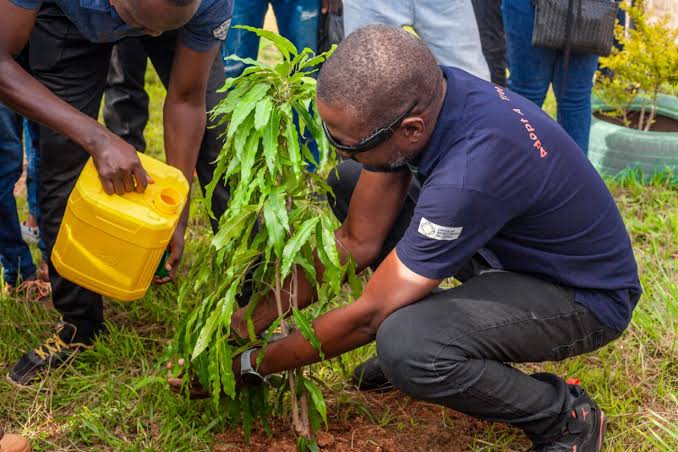Green Sahara Farms (GSF) has unveiled its Environment Social Governance Principle (ESG) report with a promise to achieve net zero emission in the next few years.
GSF in the last 10 years has been focusing on addressing the obstacles that inhibit the realization of agro-development goals using landscape restoration as well as boosting agricultural productivity to consolidate value chains, synergize resources and ensure food sufficiency in the world with Sub-Saharan Africa as a reliable base.
Being the first company in Nigeria to commit to ESG principles, GSF got recognition from Circular Bioeconomy Alliance (CBA), a programme targeted at developing global network of living labs for nature, people and the planet.
CBA was established by His Royal Majesty King Charles III and is aimed at demonstrating how harmony can be achieved by empowering people and nature while restoring biodiversity globally.
It will be recalled that the board members of the Green Sahara Farm during a board meeting held in 2019 in Abuja agreed to commit and implement the ESG principles in their day to day activities especially in their contract agreement with farmers.
The Managing Director GSF Suleiman Dikwa while rolling out the ESG report at the weekend revealed that the organization is focused on achieving Sustainable Development Goals which bothers on no poverty, no hunger and partnerships , climate change education among others.
In achieving the SDG 1 goals, Dikwa revealed that the organization has impacted 1,287 households and also created 1,025 service providers. Under the SDG 2 goal, they increased yield per hectare to 5 tonnes on 1,351 hectare directly under their control and 581 hectare indirectly under their control.
On SDG 17, he said they have collaborated with Reforest Action, Circular Bioeconomy Alliance, Green Great Wall, SDG Plateau State, Federal Ministry of Education, Environment and Niger Delta, private organizations including banks, NGOs, Spirited individuals and Sterling One Foundation
On the report of their emission releasing activities in six months as generated from Jos Electricity Distribution Company PLC – Hydro & Generators: 2019= 8,498KWH, 2020 =4,068KWH, 2021= 17,141KWH, 2022 = 16,141KWH 2023= 1,200KWH .
For Water supply Natural Sources: 2019= 120,000 litres, 2020= 90,000 litres , 2021= 200,000 litres, 2022= 250,000 litres, 2023= 30,000 litres (Six Months)
Fuel used by company vehicles 2019= 14,539 litres, 2020= 5,689 litres, 2021= 61,045 litres, 2022= 5,718 litres 2023= 355 litres, for employees travel 2019= 18,184,599, 2020= 14, 236,706, 2021= 29,058,145, 2022= 1,175,306 2023= 2,334,186 (Six Months), for waste disposal or recycling Composting of Bio-degradable waste, Recycling of two million Nursery Bags
The company’s emissions baseline report showed that about 16,380 MTs of CO2 per machine hour and kilometer per vehicle in a year, it is projected to achieve net zero emission by 2033.
Factors considered in operation especially truck and machine CO2 per hour giving 10,935.3 g per annum. For staff members 0.91 CO2 emissions per Staff based on averages of animal products consumed, unprocessed foods, housing types, materials for home construction, number of people in a household, energy efficiency, waste management, transportation, car pooling, public transport and flying. While for deforestation, 83,000 degraded hectares
On the attainment of the SDG 4 about 36 interns were trained, 25 extension workers, 17 youth corps members and six staff members were retained.
To develop an emission baseline, Dikwa explained that they have reviewed their current operation to identify emission activities and understand their carbon footprint, this gives them insight on the data to be collected and metrics to be tracked.
He further stated that for them to set their net zero targets, they first understand their emissions and then set an ambitious net zero goal with clear interim milestones as they engage with leaders to create and sustain an organization buy-in while collaborating with suppliers and employees on meeting the scope 3 challenge, as well as partner with our customers with a strategic shift from shareholding to stakeholding.
In line with the SDG goals 13 on climate change, the MD revealed that they have planted 386,000 trees in communities, 10,000 trees in 24 Unity schools as well as established young foresters club.
To achieve the net- zero emission target, he stated that about 85 households have been impacted in the use of biogas. Adding that to achieve gender equality 40 percent of farmers reached are females in while about 30 percent of their staffs are female also 50 percent of their board members are female.


